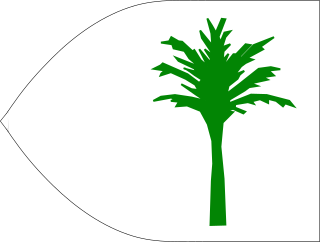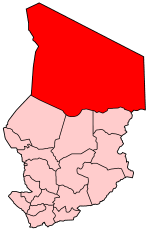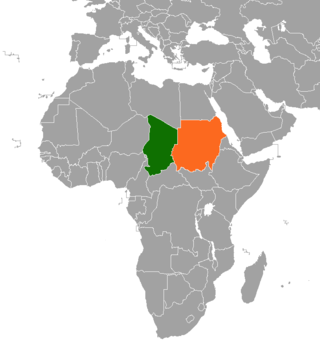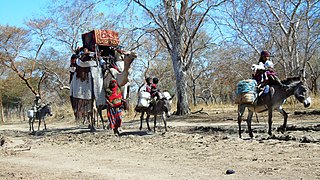Related Research Articles
The Chad National Army consists of the five Defence and Security Forces listed in Article 185 of the Chadian Constitution that came into effect on 4 May 2018. These are the National Army, the National Police, the National and Nomadic Guard (GNNT) and the Judicial Police. Article 188 of the Constitution specifies that National Defence is the responsibility of the Army, Gendarmerie and GNNT, whilst the maintenance of public order and security is the responsibility of the Police, Gendarmerie and GNNT.

The Kanem–Bornu Empire existed in areas which are now part of Nigeria, Niger, Cameroon, Libya and Chad. It was known to the Arabian geographers as the Kanem Empire from the 8th century AD onward and lasted as the independent kingdom of Bornu until 1900.
The Zaghawa people, also called Beri or Zakhawa, are an ethnic group primarily residing in southwestern Libya, northeastern Chad, and western Sudan, including Darfur.

The Saharan languages are a small family of languages across parts of the eastern Sahara, extending from northwestern Sudan to southern Libya, north and central Chad, eastern Niger and northeastern Nigeria. Noted Saharan languages include Kanuri, Daza, Teda, and Zaghawa. They have been classified as part of the hypothetical but controversial Nilo-Saharan family.

Wadi Fira is one of the 23 regions of Chad. Its capital is the town of Biltine. The region corresponds with the former prefecture of Biltine.
Platform for Change, Unity and Democracy, abbreviated as S.C.U.D., is a Chadian rebel group that was formed in October 2005 by former members of the Military of Chad who deserted and united under founders and current leaders, 30-year-old Yaya Dillo Djérou and his brother. The group's main objective is to oust the government of the current Chadian president, and uncle of Djérou and his brother, Idriss Déby. SCUD has bases in eastern Chad and in the Darfur region of Sudan. On December 18, 2005, SCUD, along with members of the Rally for Democracy and Liberty (RDL) rebel group, attacked Chadian troops stationed in the city of Adré, sparking the Chadian-Sudanese conflict.

The Bilala or Bulala are a Muslim people that live around Lake Fitri, in the Batha Prefecture, in central Chad. The last Chadian census in 1993 stated that they numbered 136,629 people. Their language, Naba, is divided in four dialects and is a part of the Central Sudanic language family; it is shared by two of their neighbours, the Kuka and the Medogo. These three peoples are collectively known as Lisi and are believed to be descendants of main ethnic groups of the Sultanate of Yao.
The Tunjur people are a Sunni Muslim ethnic group living in eastern Chad and western Sudan. In the 21st century, their numbers have been estimated at 175,000 people.

The Borkou-Ennedi-Tibesti (BET) was until 2008 one of the then 18 regions of Chad, its capital being Faya-Largeau. It comprised the former Borkou-Ennedi-Tibesti Prefecture. Most of the region was part of the Sahara desert.
Guéréda is a town in the Wadi Fira Region, Chad. It is located at around 14°30′30″N22°5′13″E.
Dar Tama is one of three departments in Wadi Fira, a region of Chad. Its capital is Gueréda, 165 kilometres (100 mi) northeast of Abéché. The population consists primarily of non-Arab tribes. Dar Tama is the historical home of the Tama, who make up the majority of the population. The Zaghawa make up a significant minority and migrated during the Sahelian drought in the 1980s. Both are non-Arab tribes. Former Chadian president Idriss Déby is from the Zaghawa tribe.
Tama are a non-Arab, African ethnic group of people who live in eastern Chad and western Sudan. They speak Tama, a Nilo-Saharan language. The population is 200,000–300,000 people and they practice Islam. Many Tama are subsistence farmers who live in permanent settlements and some raise livestock. In the civil war in Chad the Tama were involved in ethnic conflicts with the Zaghawa tribe.

The 2004 Chadian coup d'état attempt was an attempted coup d'état against the Chadian President Idriss Déby that was foiled on the night of May 16, 2004.
Tuba, also Bidayat (Bideyat), is a dialect of the Zaghawa language found in Chad and western Sudan. In contrast to their Zaghawa kin, Bidayat speakers are more nomadic. This difference led early ethnographers to refer to them as different groups until linguistic similarities proved their close relationship.

Human rights in Chad have been described as "poor"; for example, Freedom House has designated the country as "Not Free." Chad received a score of 7 for political rights and 6 for civil liberties.
Zaghawa is a Nilo-Saharan language spoken by the Zaghawa people of east-central Chad and northwestern Sudan (Darfur). The people who speak this language call it Beria, from Beri, the endonym of the Zaghawa people, and a, Zaghawa for "mouth". It has been estimated that there are about 447,400 native speakers of the Zaghawa language, who primarily live in Chad and the Darfur region of Sudan. It is also spoken by a smaller number of speakers in Libya.

The populations of eastern Chad and western Sudan established social and religious ties long before either nation's independence, and these remained strong despite disputes between governments. In recent times, relations have been strained due to the conflict in Darfur and a civil war in Chad, which both governments accuse the other of supporting.

Timane Erdimi is the leader of the Chadian rebel group Rally of Democratic Forces which had 800 soldiers in early 2008. He is a member of the ethnic group Zaghawa and nephew of the Chadian President Idriss Déby.

The population of Chad has numerous ethnic groups. SIL Ethnologue reports more than 130 distinct languages spoken in Chad.

The Zaghawa or Beria alphabet, Beria Giray Erfe, is an indigenous alphabetic script proposed for the Zaghawa language of Darfur and Chad.
References
- ↑ Tubiana, Jerome. Sudan/Darfur: Land and Power: the Case of the Zaghawa . Accessed 9 May 2010.
- ↑ Chad tribe holds cross-border sway . Al Jazeera English. Published 9 May 2010. Accessed 9 May 2010. (at YouTube)